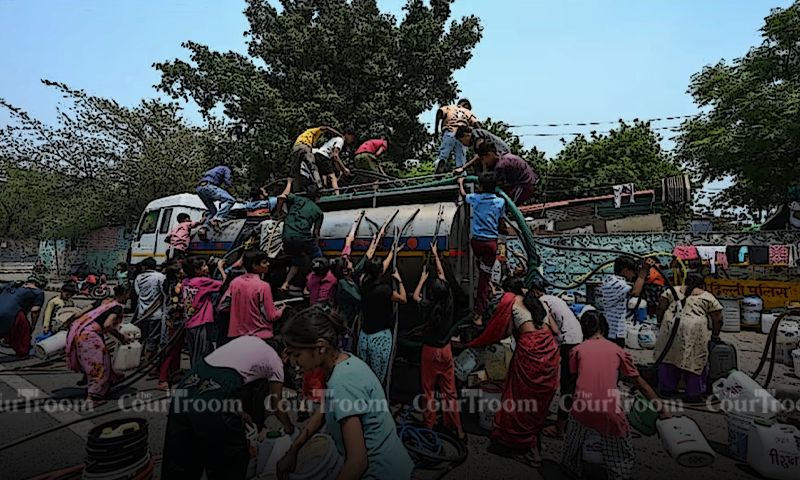Delhi is currently grappling with a severe water crisis as the availability of raw water has plummeted below targeted levels, latest area to hit is South Delhi.
On a recent Sunday, the city recorded its lowest water supply of the season, falling short by 10% of the aimed 1,000 million gallons per day (mgd). This shortfall has exacerbated an ongoing water crisis that has plagued the capital for nearly a fortnight.
Allegations of Sabotage:
In a startling development, Water Minister Atishi has accused the Bharatiya Janata Party (BJP) of plotting to exacerbate the crisis by deliberately damaging critical water pipelines. She pointed out a major leak discovered in the south Delhi main pipeline near Garhi Mandu, where six hours of repair work were required, resulting in a 25% reduction in water supply to south Delhi on that day alone. Atishi has urgently requested Delhi Police to deploy personnel to safeguard major pipelines and prevent further tampering.
Major Pipeline Leak in South Delhi:
The leakage in the South Delhi main pipeline near Garhi Mandu was a significant setback, disrupting water supply operations. Atishi revealed that during the investigation, it was found that multiple bolts of the pipeline had been cut, suggesting foul play and deliberate sabotage. The repair work, which lasted from 4 pm to 10 pm, severely impacted water distribution to South Delhi, underscoring vulnerabilities in the city’s water infrastructure.
Political Tensions Escalate:
At a press conference, Atishi leveled serious allegations against the BJP, outlining a three-part conspiracy against Delhi. She accused the BJP of manipulating Haryana’s water supply to Delhi, orchestrating pipeline vandalism for political gain, and instigating violence at Delhi Jal Board (DJB) offices. These allegations have intensified the political confrontation between the ruling AAP government and the opposition BJP, further complicating efforts to resolve the water crisis.
Impact on Residents:
The water crisis has had a profound impact on residents, particularly in areas like Vasant Kunj and Greater Kailash 2, where severe water shortages have disrupted daily life. The Delhi Jal Board (DJB) reported reduced outputs from key water treatment plants such as Sonia Vihar and Wazirabad, which are dependent on inadequate raw water from sources like the Upper Ganga Canal and Yamuna River. This has contributed to the citywide struggle for consistent and reliable water access.
Blame Game Intensifies:
The blame game between political parties has intensified as the crisis persists. The BJP has accused the AAP-led Delhi government of mismanagement and corruption, alleging that inefficiencies in water management have exacerbated the crisis. In response, the AAP government has criticized Haryana for restricting raw water supply to Delhi, deflecting blame and underscoring the challenges of inter-state water management amid political rivalries.
Ongoing Challenges:
Amidst the heated political rhetoric and accusations, residents continue to face ongoing challenges in securing adequate water supplies, particularly during a relentless summer heatwave. The crisis highlights the urgent need for sustainable solutions to safeguard Delhi’s water security, emphasizing the importance of robust infrastructure and effective governance in managing essential resources.


